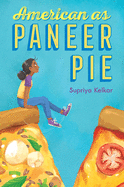
Justice warriors like Malala are often born with their fighting spirits; much harder is turning a highly embarrassable 11-year-old into an activist. A galvanizing transformation can be found in Supriya Kelkar'smiddle-grade novel American as Paneer Pie. It's narrated by sixth grader Lekha Divekar, an Indian American girl who's trying to be a "good Desi kid" at home while blending in at her nearly all-white school.
For Lekha, whose parents emigrated from Mumbai and are raising her outside Detroit, attending middle school means regularly fielding belittling questions: "Why do you guys have dots on your forehead?," "Why does your food smell so funny?" and so on. When Avantika, a Desi girl Lekha's age, moves into the neighborhood, Lekha is euphoric: now she won't be the only one who knows "what it's like to have two lives, your Indian life at home and your American life at school." But Avantika intends to live one life, and she talks back, her Indian accent undisguised, to the school's premier bully. Lekha starts to wonder: Could it be that keeping her mouth shut isn't necessarily the best way to get by?
American as Paneer Pie has some cardboard villains, but the novel succeeds valiantly at exposing the conflicted loyalties felt by many children of immigrants. While Kelkar (Ahimsa; The Many Colors of Harpreet Singh) is generous with details of Desi culture, readers won't lose sight of the fact that Lekha is a typical, sympathetic tween determined "to be normal, like everyone else." --Nell Beram, freelance writer and YA author

